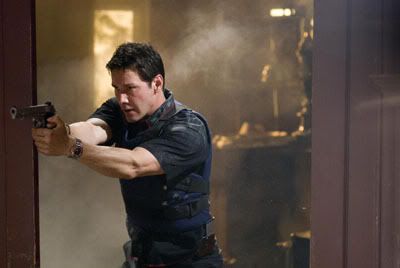
Now that he is entering middle age and has packed on a few extra pounds, filling out particularly in the face, I can buy Keanu Reeves as a haggard, broken down LAPD veteran, a man who might not be on a path to redemption but at least wants to prove he isn’t the worst of the city’s bad cops.
In Street Kings, Reeves is Detective Tom Ludlow. He has a Dirty-Harry-esque, the-end-justifies-the-means approach to his job. He chugs vodka on the way to crime scenes and doesn’t hesitate to put a bad guy down, even if said bad guy is unarmed and on the toilet. He rests easy knowing his influential captain, Jack Wander (Forest Whitaker), has his back. Killing four suspects during the rescue of two kidnapped girls draws the attention of Capt. James Biggs (Hugh Laurie) from Internal Affairs. Ludlow’s former partner, Washington (Terry Crews), has been ratting out his entire squad to IA. Ludlow follows Washington, ready to give him a stern talking-to, but two thugs get to him first, gunning him down in a convenience store.
Ludlow seems an obvious suspect, though Wander makes that suspicion go away a little too quickly and reassigns him to a desk job. Washington and Ludlow once were like brothers and Ludlow is not about to let his murder go unavenged. He teams with the young detective assigned to the case, Paul Diskant (Chris Evans), and together they uncover corruption within the LAPD on a scale that makes Ludlow seem like a Boy Scout by comparison.
It’s a familiar refrain for David Ayer, the Training Day writer directing his second feature here, and famed crime novelist James Ellroy (L.A. Confidential, The Black Dahlia), who scores a story credit to go along with co-writing the script with Kurt Wimmer and Jamie Moss. They navigate this terrain with ease. Though we certainly hope this kind of scenario is farfetched, there is a grit and earnestness about it that lends an air of authenticity. It’s easy to discern were the plot is heading, yet Ludlow and Diskant’s investigation is fraught with tension and suspense. The filmmakers slip up only toward the end by piling on a few too many contrivances and unintentionally making their raving villain comical.
As with all of Ellroy’s work, there is a rich tapestry of supporting characters. The actors portraying them are hit-and-miss with their performances. Jay Mohr, John Corbett and Amaury Nolasco, as the other detectives in Ludlow’s squad, overact every second they’re on screen. Whitaker speaks with a New York accent that seems much too thick for someone who has been with the LAPD for as long as Wander has. Aside from that, he does his usual solid work, with some of Idi Amin’s bravado still lingering. The casting of Laurie as the snarky, arrogant IA captain is problematic; I couldn’t help thinking of Dr. House and I’ve only seen part of one episode of the hit TV series. The real standouts are Evans, who gets Diskant’s mix of idealism, intelligence, confidence, trepidation and, ultimately, revulsion just right, and Cedric the Entertainer, who gets a handful of amusing moments as a drug dealer called Scribble. Rappers Common and The Game also appear as unsavory characters who pop up during the investigation.
Street Kings, though, belongs to Reeves. He appears in virtually every scene and responds with what is easily his best work since The Matrix (1999). Ludlow is a meaty role, a conflicted man channeling his grief and anger over his wife’s death and infidelity into his self-appointed role of judge, jury and executioner. Reeves sticks to his typical low-key style, but there’s more going on here than usual. He is not the blank slate he has been so often in the past and he’s not completely wooden when the script requires him to emote. He puts the movie on his shoulders and runs with it.
“What happened to just putting away bad people?” Ludlow asks late in the film. It’s a question he is asking of himself as much as the man ultimately revealed as the villain. The reply: “We’re all bad, Tom.” Ludlow doesn’t dispute that, and given what we’ve seen leading up to this point, it would be meaningless if he did. In the worlds of Ayer and Ellroy, the darkness is in all of us. The question is whether we use it for good or ill. Who would have thought Keanu Reeves would be the actor to help them so skillfully make that point?
GRADE: B
(Rated R for strong violence and pervasive language. 107 minutes.)
No comments:
Post a Comment